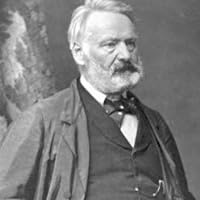Victor Hugo Quotes
Quotes tagged as "victor-hugo"
Showing 1-30 of 118

“A garden to walk in and immensity to dream in--what more could he ask? A few flowers at his feet and above him the stars.”
― Les Misérables
― Les Misérables

“Marius and Cosette were in the dark in regard to each other. They did not speak, they did not bow, they were not acquainted; they saw each other; and, like the stars in the sky separated by millions of leagues, they lived by gazing upon each other.”
― Les Misérables
― Les Misérables

“She let her head fall back upon Marius' knees and her eyelids closed. He thought that poor soul had gone. Eponine lay motionless; but just when Marius supposed her for ever asleep, she slowly opened her eyes in which the gloomy deepness of death appeared, and said to him with an accent the sweetness on which already seemed to come from another world:
"And then, do you know, Monsieur Marius, I believe I was a little in love with you."
She essayed to smile again and expired.”
― Les Misérables
"And then, do you know, Monsieur Marius, I believe I was a little in love with you."
She essayed to smile again and expired.”
― Les Misérables

“The poor man shuddered, overflowed with an angelic joy; he declared in his transport that this would last through life; he said to himself that he really had not suffered enough to deserve such radiant happiness, and he thanked God, in the depths of his soul, for having permitted that he, a miserable man, should be so loved by this innocent being.”
― Les Misérables
― Les Misérables

“The book the reader has now before his eyes - from one end to the other, in its whole and in its details, whatever the omissions, the exceptions, or the faults - is the march from evil to good, from injustice to justice, from the false to the true, from night to day, from appetite to conscience, from rottenness to life, from brutality to duty, from Hell to Heaven, from nothingness to God. Starting point: matter; goal: the soul. Hydra at the beginning, angel at the end.”
― Les Misérables
― Les Misérables

“But secondly you say 'society must exact vengeance, and society must punish'. Wrong on both counts. Vengeance comes from the individual and punishment from God.”
― The Last Day of a Condemned Man
― The Last Day of a Condemned Man

“But alas, if I have not maintained my victory, it is God's fault for not making man and the devil of equal strength.”
― The Hunchback of Notre-Dame
― The Hunchback of Notre-Dame

“Hardly had the light been extinguished, when a peculiar trembling began
to affect the netting under which the three children lay.
It consisted of a multitude of dull scratches which produced a metallic
sound, as if claws and teeth were gnawing at the copper wire. This was
accompanied by all sorts of little piercing cries.
The little five-year-old boy, on hearing this hubbub overhead, and
chilled with terror, jogged his brother's elbow; but the elder brother
had already shut his peepers, as Gavroche had ordered. Then the little
one, who could no longer control his terror, questioned Gavroche, but in
a very low tone, and with bated breath:--
"Sir?"
"Hey?" said Gavroche, who had just closed his eyes.
"What is that?"
"It's the rats," replied Gavroche.
And he laid his head down on the mat again.
The rats, in fact, who swarmed by thousands in the carcass of the
elephant, and who were the living black spots which we have already
mentioned, had been held in awe by the flame of the candle, so long as
it had been lighted; but as soon as the cavern, which was the same
as their city, had returned to darkness, scenting what the good
story-teller Perrault calls "fresh meat," they had hurled themselves in
throngs on Gavroche's tent, had climbed to the top of it, and had begun
to bite the meshes as though seeking to pierce this new-fangled trap.
Still the little one could not sleep.
"Sir?" he began again.
"Hey?" said Gavroche.
"What are rats?"
"They are mice."
This explanation reassured the child a little. He had seen white mice in
the course of his life, and he was not afraid of them. Nevertheless, he
lifted up his voice once more.
"Sir?"
"Hey?" said Gavroche again.
"Why don't you have a cat?"
"I did have one," replied Gavroche, "I brought one here, but they ate
her."
This second explanation undid the work of the first, and the little
fellow began to tremble again.
The dialogue between him and Gavroche began again for the fourth time:--
"Monsieur?"
"Hey?"
"Who was it that was eaten?"
"The cat."
"And who ate the cat?"
"The rats."
"The mice?"
"Yes, the rats."
The child, in consternation, dismayed at the thought of mice which ate
cats, pursued:--
"Sir, would those mice eat us?"
"Wouldn't they just!" ejaculated Gavroche.
The child's terror had reached its climax. But Gavroche added:--
"Don't be afraid. They can't get in. And besides, I'm here! Here, catch
hold of my hand. Hold your tongue and shut your peepers!”
― Les Misérables
to affect the netting under which the three children lay.
It consisted of a multitude of dull scratches which produced a metallic
sound, as if claws and teeth were gnawing at the copper wire. This was
accompanied by all sorts of little piercing cries.
The little five-year-old boy, on hearing this hubbub overhead, and
chilled with terror, jogged his brother's elbow; but the elder brother
had already shut his peepers, as Gavroche had ordered. Then the little
one, who could no longer control his terror, questioned Gavroche, but in
a very low tone, and with bated breath:--
"Sir?"
"Hey?" said Gavroche, who had just closed his eyes.
"What is that?"
"It's the rats," replied Gavroche.
And he laid his head down on the mat again.
The rats, in fact, who swarmed by thousands in the carcass of the
elephant, and who were the living black spots which we have already
mentioned, had been held in awe by the flame of the candle, so long as
it had been lighted; but as soon as the cavern, which was the same
as their city, had returned to darkness, scenting what the good
story-teller Perrault calls "fresh meat," they had hurled themselves in
throngs on Gavroche's tent, had climbed to the top of it, and had begun
to bite the meshes as though seeking to pierce this new-fangled trap.
Still the little one could not sleep.
"Sir?" he began again.
"Hey?" said Gavroche.
"What are rats?"
"They are mice."
This explanation reassured the child a little. He had seen white mice in
the course of his life, and he was not afraid of them. Nevertheless, he
lifted up his voice once more.
"Sir?"
"Hey?" said Gavroche again.
"Why don't you have a cat?"
"I did have one," replied Gavroche, "I brought one here, but they ate
her."
This second explanation undid the work of the first, and the little
fellow began to tremble again.
The dialogue between him and Gavroche began again for the fourth time:--
"Monsieur?"
"Hey?"
"Who was it that was eaten?"
"The cat."
"And who ate the cat?"
"The rats."
"The mice?"
"Yes, the rats."
The child, in consternation, dismayed at the thought of mice which ate
cats, pursued:--
"Sir, would those mice eat us?"
"Wouldn't they just!" ejaculated Gavroche.
The child's terror had reached its climax. But Gavroche added:--
"Don't be afraid. They can't get in. And besides, I'm here! Here, catch
hold of my hand. Hold your tongue and shut your peepers!”
― Les Misérables

“Querer prohibir a la imaginación que vuelva a una idea es lo mismo que prohibir al mar que vuelva a la playa.”
― Les Misérables
― Les Misérables

“Just imagine! In the early nineteenth century, this cathedral was in such a state of disrepair that the city considered tearing it down. Luckily for us, Victor Hugo heard about the plans to destroy it and wrote The Hunchback of Notre-Dame to raise awareness of its glorious history. And, by golly, did it work! Parisians campaigned to save it, and the building was repaired and polished to the pristine state you find today.”
― Anna and the French Kiss
― Anna and the French Kiss

“Ma vie est une énigme dont ton nom est le mot. (My life is an enigma, of which your name is the word.)”
―
―

“So long as there shall exist, by virtue of law and custom, decrees of damnation pronounced by society, artificially creating hells amid the civilization of earth, and adding the element of human fate to divine destiny; so long as the three great problems of the century—the degradation of man through pauperism, the corruption of woman through hunger, the crippling of children through lack of light—are unsolved; so long as social asphyxia is possible in any part of the world;—in other words, and with a still wider significance, so long as ignorance and poverty exist on earth, books of the nature of Les Misérables cannot fail to be of use. HAUTEVILLE HOUSE, 1862. [Translation by Isabel F. Hapgood]”
― Les Misérables
― Les Misérables

“The merciful precepts of Christ will at last suffuse the Code and it will glow with their radiance. Crime will be considered an illness with its own doctors to replace your judges and its hospitals to replace your prisons. Liberty shall be equated with health. Ointments and oil shall be applied to limbs that were once shackled and branded. Infirmities that once were scourged with anger shall now be bathed with love. The cross in place of the gallows: sublime and yet so simple.”
― The Last Day of a Condemned Man
― The Last Day of a Condemned Man

“Victor Hugo continues to be popular today not because of his multivolume works, which people may never have time or patience to read, but rather because of his unique experiences, his political activities and his immense influence on French history.”
―
―

“Victor Hugo n’est pas uniquement reconnu pour ses œuvres, cet intellectuel engagé et influent est reconnu surtout pour sa carrière politique très importante et son influence énorme sur l’histoire de la France.”
―
―

“L’un des défauts de l’écrivain arabe est qu’il écrit pour satisfaire cinq membres du jury du prix au lieu de satisfaire les masses du monde entier. l’obsession des prix littéraires et l’enfermement de la littérature Arabe dans le régionalisme sont parmi les raisons de l’échec de l’écrivain arabe à atteindre la renommée mondiale.”
―
―

“Let no one misunderstand our idea; we do not confound what are called 'political opinions' with that grand aspiration after progress with that sublime patriotic, democratic, and human faith, which, in our days, should be the very foundation of all generous intelligence.”
― Les Misérables
― Les Misérables

“L'istinto di Cosette cercava un padre, come quello di Valjean cercava un figlio, e incontrarsi, per essi, significò trovarsi; nel momento misterioso in cui le loro mani s'incontrarono, si saldarono. Quando quelle due anime si scorsero, riconobbero di essere ciascuna quel che abbisognava all'altra e s'abbracciarono strettamente.”
― Les Misérables
― Les Misérables

“The barber ran to the broken window, and saw Gavroche, who was running with all his might towards the Saint Jean market. On passing the barber's shop, Gavroche, who had the two children on his mind, could not resist the desire to bid him "good day", and had sent a stone through his sash.
"See!" screamed the barber, who from white had become blue, "he makes mischief. What has anybody done to this Gamin?”
― Les Misérables
"See!" screamed the barber, who from white had become blue, "he makes mischief. What has anybody done to this Gamin?”
― Les Misérables

“Tabahlah saat menghadapi penderitaan besar,
Sabarlah saat menghadapi penderitaan kecil,
Dan kalau anda sudah melaksanakan dengan giat tugas anda sehari-hari,
Pergilah tidur dengan damai.
Tuhan selalu berjaga.”
―
Sabarlah saat menghadapi penderitaan kecil,
Dan kalau anda sudah melaksanakan dengan giat tugas anda sehari-hari,
Pergilah tidur dengan damai.
Tuhan selalu berjaga.”
―

“To sum up: all nature-spirits are not the same as fairies; nor are all fairies nature-spirits. The same applies to the relationship of nature-spirits and the dead. But we may safely say that a large proportion of nature-spirits became fairies, while quite a number of the dead in some areas seem to take on the character of nature-spirits. We cannot expect any fixity of rule in dealing with barbaric thought. We must take it as it comes. It bears the same relationship to "civilized" or folk-lore theory as does the growth of the jungle to a carefully designed and meticulously labelled botanical garden. As Victor Hugo once exclaimed when writing of the barbaric confusion which underlies the creative function in poetry: 'What do you expect? You are among savages!”
― British Fairy Origins
― British Fairy Origins

“We, who do not believe what these women believe, but who, like them, live by faith, have never been able to contemplate without a kind of compassionate and religious anguish, a kind of pity full of envy, those devout, quaking, trusting creatures, those humble, noble souls who dare to live on the very brink of mystery, waiting, between the world on which they have closed the door and a heaven that remains unopen, turned towards the invisible light with the sole joy of thinking they know where it is, aspiring to the abyss and the unknown, their eyes fixed on the still darkness, kneeling, overwhelmed, amazed, trembling, half raised at times by the deep breaths of eternity.”
― Les Misérables
― Les Misérables

“Monseigneur Bienvenu was no genius. He would have feared those sublime peaks from which some, even the very great among them such as Swedenborg and Pascal, have slipped into insanity. Certainly, these powerful conceits have their moral usefulness and by these arduous paths one may approach ideal perfection. But he took the shorter path: the Gospel.”
― Les Misérables
― Les Misérables

“Do you acknowledge yourself a member of the rogues' brigade?" continued the King of Tunis.
"Of the rogues' brigade."
"A subject of the kingdom of Cant?"
"Of the kingdom of Cant."
"A vagrant?"
"A vagrant."
"At heart?"
"At heart."
I would call your attention to the fact," added the king, "that you will be hanged none the less."
"The devil!" said the poet.
"Only" continued Clopin, quite unmoved, "you will be hanged later, with more ceremony, at the cost of the good city of Paris, on a fine stone gallows, and by honest men. That is some consolation."
"As you say," responded Gringoire.”
― The Hunchback of Notre-Dame
"Of the rogues' brigade."
"A subject of the kingdom of Cant?"
"Of the kingdom of Cant."
"A vagrant?"
"A vagrant."
"At heart?"
"At heart."
I would call your attention to the fact," added the king, "that you will be hanged none the less."
"The devil!" said the poet.
"Only" continued Clopin, quite unmoved, "you will be hanged later, with more ceremony, at the cost of the good city of Paris, on a fine stone gallows, and by honest men. That is some consolation."
"As you say," responded Gringoire.”
― The Hunchback of Notre-Dame
All Quotes
|
My Quotes
|
Add A Quote
Browse By Tag
- Love Quotes 96.5k
- Life Quotes 75.5k
- Inspirational Quotes 72k
- Humor Quotes 43.5k
- Philosophy Quotes 29.5k
- Inspirational Quotes Quotes 26.5k
- God Quotes 26k
- Truth Quotes 23.5k
- Wisdom Quotes 23.5k
- Romance Quotes 22.5k
- Poetry Quotes 22k
- Death Quotes 20k
- Happiness Quotes 18.5k
- Life Lessons Quotes 18.5k
- Hope Quotes 17.5k
- Faith Quotes 17.5k
- Quotes Quotes 16.5k
- Inspiration Quotes 16.5k
- Spirituality Quotes 15k
- Religion Quotes 15k
- Motivational Quotes 14.5k
- Writing Quotes 14.5k
- Relationships Quotes 14.5k
- Life Quotes Quotes 14k
- Love Quotes Quotes 13.5k
- Success Quotes 13.5k
- Time Quotes 12k
- Motivation Quotes 12k
- Science Quotes 11.5k
- Knowledge Quotes 11k



